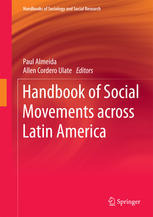

Most ebook files are in PDF format, so you can easily read them using various software such as Foxit Reader or directly on the Google Chrome browser.
Some ebook files are released by publishers in other formats such as .awz, .mobi, .epub, .fb2, etc. You may need to install specific software to read these formats on mobile/PC, such as Calibre.
Please read the tutorial at this link: https://ebookbell.com/faq
We offer FREE conversion to the popular formats you request; however, this may take some time. Therefore, right after payment, please email us, and we will try to provide the service as quickly as possible.
For some exceptional file formats or broken links (if any), please refrain from opening any disputes. Instead, email us first, and we will try to assist within a maximum of 6 hours.
EbookBell Team

4.8
94 reviewsThis handbook covers social movement activities in Latin American countries that have had profound consequences on the political culture of the region. It examines the developments of the past twenty years, such as a renewed upswing in popular mobilization, the ending of violent conflicts and military governments, new struggles and a relatively more democratic climate. It shows that, from southern Chiapas to Argentina, social movements in the 1990s and especially in the 2000s, have reached new heights of popular participation. There is a lack of research on the politics of this region in the contemporary era of globalization, this volume partially fills the void and offers a rich resource to students, scholars and the general public in terms of understanding the politics of mass mobilization in the early twenty-first century. The contributors each address social movement activity in their own nation and together they present a multidisciplinary perspective on the topic. Each chapter uses a case study design to bring out the most prominent attributes of the particular social struggle(s), for instance the main protagonists in the campaigns, the grievances of the population and the outcomes of the struggles. This Handbook is divided into seven substantive themes, providing overall coherence to a broad range of social conflicts across countries, issues and social groups. These themes include: 1) theory of Latin American social movements; 2) neoliberalism; 3) indigenous struggles; 4) women’s movements; 5) movements and the State; 6) environmental movements; and 7) transnational mobilizations.